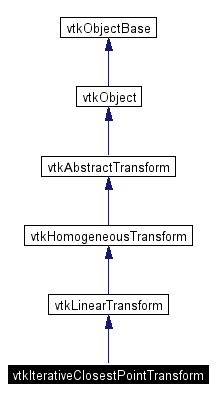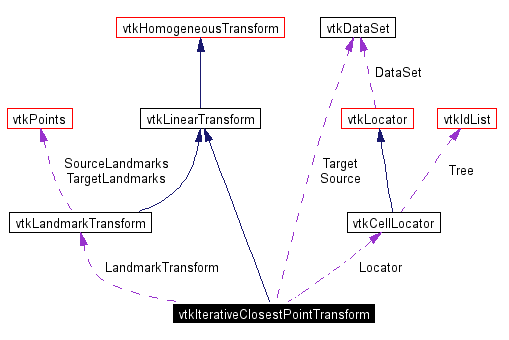vtkIterativeClosestPointTransform Class Reference
#include <vtkIterativeClosestPointTransform.h>
Inheritance diagram for vtkIterativeClosestPointTransform:
 [legend]
[legend]Collaboration diagram for vtkIterativeClosestPointTransform:
 [legend]List of all members.
[legend]List of all members.
Detailed Description
Implementation of the ICP algorithm.
Match two surfaces using the iterative closest point (ICP) algorithm. The core of the algorithm is to match each vertex in one surface with the closest surface point on the other, then apply the transformation that modify one surface to best match the other (in a least square sense). This has to be iterated to get proper convergence of the surfaces.
- Attention:
- Use vtkTransformPolyDataFilter to apply the resulting ICP transform to your data. You might also set it to your actor's user transform.
This class makes use of vtkLandmarkTransform internally to compute the best fit. Use the GetLandmarkTransform member to get a pointer to that transform and set its parameters. You might, for example, constrain the number of degrees of freedom of the solution (i.e. rigid body, similarity, etc.) by checking the vtkLandmarkTransform documentation for its SetMode member.
- See also:
- vtkLandmarkTransform
- Created by:
-
- CVS contributions (if > 5%):
-
- CVS logs (CVSweb):
/Hybrid/vtkIterativeClosestPointTransform.cxx)/Hybrid/vtkIterativeClosestPointTransform.h)
- Tests:
- vtkIterativeClosestPointTransform (Tests)
Definition at line 63 of file vtkIterativeClosestPointTransform.h.
Member Typedef Documentation
Constructor & Destructor Documentation
| vtkIterativeClosestPointTransform::vtkIterativeClosestPointTransform |
( |
|
) |
[protected] |
|
Member Function Documentation
|
|
Create an object with Debug turned off, modified time initialized to zero, and reference counting on.
Reimplemented from vtkObject. |
| virtual const char* vtkIterativeClosestPointTransform::GetClassName |
( |
|
) |
[virtual] |
|
| int vtkIterativeClosestPointTransform::IsTypeOf |
( |
const char * |
type |
) |
[static] |
|
|
|
Return 1 if this class type is the same type of (or a subclass of) the named class. Returns 0 otherwise. This method works in combination with vtkTypeRevisionMacro found in vtkSetGet.h.
Reimplemented from vtkLinearTransform. |
| virtual int vtkIterativeClosestPointTransform::IsA |
( |
const char * |
type |
) |
[virtual] |
|
|
|
Return 1 if this class is the same type of (or a subclass of) the named class. Returns 0 otherwise. This method works in combination with vtkTypeRevisionMacro found in vtkSetGet.h.
Reimplemented from vtkLinearTransform. |
| void vtkIterativeClosestPointTransform::PrintSelf |
( |
ostream & |
os, |
|
|
vtkIndent |
indent |
|
) |
[virtual] |
|
|
|
Methods invoked by print to print information about the object including superclasses. Typically not called by the user (use Print() instead) but used in the hierarchical print process to combine the output of several classes.
Reimplemented from vtkLinearTransform. |
| void vtkIterativeClosestPointTransform::SetSource |
( |
vtkDataSet * |
source |
) |
|
|
|
|
Specify the source and target data sets. |
| void vtkIterativeClosestPointTransform::SetTarget |
( |
vtkDataSet * |
target |
) |
|
|
|
|
Specify the source and target data sets. |
| virtual vtkDataSet* vtkIterativeClosestPointTransform::GetSource |
( |
|
) |
[virtual] |
|
|
|
Specify the source and target data sets. |
| virtual vtkDataSet* vtkIterativeClosestPointTransform::GetTarget |
( |
|
) |
[virtual] |
|
|
|
Specify the source and target data sets. |
| void vtkIterativeClosestPointTransform::SetLocator |
( |
vtkCellLocator * |
locator |
) |
|
|
|
|
Set/Get a spatial locator for speeding up the search process. An instance of vtkCellLocator is used by default. |
| virtual vtkCellLocator* vtkIterativeClosestPointTransform::GetLocator |
( |
|
) |
[virtual] |
|
|
|
Set/Get a spatial locator for speeding up the search process. An instance of vtkCellLocator is used by default. |
| virtual void vtkIterativeClosestPointTransform::SetMaximumNumberOfIterations |
( |
int |
|
) |
[virtual] |
|
|
|
Set/Get the maximum number of iterations |
| virtual int vtkIterativeClosestPointTransform::GetMaximumNumberOfIterations |
( |
|
) |
[virtual] |
|
|
|
Set/Get the maximum number of iterations |
| virtual int vtkIterativeClosestPointTransform::GetNumberOfIterations |
( |
|
) |
[virtual] |
|
|
|
Get the number of iterations since the last update |
| virtual void vtkIterativeClosestPointTransform::SetCheckMeanDistance |
( |
int |
|
) |
[virtual] |
|
|
|
Force the algorithm to check the mean distance between two iteration. |
| virtual int vtkIterativeClosestPointTransform::GetCheckMeanDistance |
( |
|
) |
[virtual] |
|
|
|
Force the algorithm to check the mean distance between two iteration. |
| virtual void vtkIterativeClosestPointTransform::CheckMeanDistanceOn |
( |
|
) |
[virtual] |
|
|
|
Force the algorithm to check the mean distance between two iteration. |
| virtual void vtkIterativeClosestPointTransform::CheckMeanDistanceOff |
( |
|
) |
[virtual] |
|
|
|
Force the algorithm to check the mean distance between two iteration. |
| virtual void vtkIterativeClosestPointTransform::SetMeanDistanceMode |
( |
int |
|
) |
[virtual] |
|
|
|
Specify the mean distance mode. This mode expresses how the mean distance is computed. The RMS mode is the square root of the average of the sum of squares of the closest point distances. The Absolute Value mode is the mean of the sum of absolute values of the closest point distances. |
| virtual int vtkIterativeClosestPointTransform::GetMeanDistanceMode |
( |
|
) |
[virtual] |
|
|
|
Specify the mean distance mode. This mode expresses how the mean distance is computed. The RMS mode is the square root of the average of the sum of squares of the closest point distances. The Absolute Value mode is the mean of the sum of absolute values of the closest point distances. |
| void vtkIterativeClosestPointTransform::SetMeanDistanceModeToRMS |
( |
|
) |
[inline] |
|
|
|
Specify the mean distance mode. This mode expresses how the mean distance is computed. The RMS mode is the square root of the average of the sum of squares of the closest point distances. The Absolute Value mode is the mean of the sum of absolute values of the closest point distances.
Definition at line 112 of file vtkIterativeClosestPointTransform.h.
References VTK_ICP_MODE_RMS. |
| void vtkIterativeClosestPointTransform::SetMeanDistanceModeToAbsoluteValue |
( |
|
) |
[inline] |
|
|
|
Specify the mean distance mode. This mode expresses how the mean distance is computed. The RMS mode is the square root of the average of the sum of squares of the closest point distances. The Absolute Value mode is the mean of the sum of absolute values of the closest point distances.
Definition at line 114 of file vtkIterativeClosestPointTransform.h.
References VTK_ICP_MODE_AV. |
| const char* vtkIterativeClosestPointTransform::GetMeanDistanceModeAsString |
( |
|
) |
|
|
|
|
Specify the mean distance mode. This mode expresses how the mean distance is computed. The RMS mode is the square root of the average of the sum of squares of the closest point distances. The Absolute Value mode is the mean of the sum of absolute values of the closest point distances. |
| virtual void vtkIterativeClosestPointTransform::SetMaximumMeanDistance |
( |
double |
|
) |
[virtual] |
|
|
|
Set/Get the maximum mean distance between two iteration. If the mean distance is lower than this, the convergence stops. |
| virtual double vtkIterativeClosestPointTransform::GetMaximumMeanDistance |
( |
|
) |
[virtual] |
|
|
|
Set/Get the maximum mean distance between two iteration. If the mean distance is lower than this, the convergence stops. |
| virtual double vtkIterativeClosestPointTransform::GetMeanDistance |
( |
|
) |
[virtual] |
|
|
|
Get the mean distance between the last two iterations. |
| virtual void vtkIterativeClosestPointTransform::SetMaximumNumberOfLandmarks |
( |
int |
|
) |
[virtual] |
|
|
|
Set/Get the maximum number of landmarks sampled in your dataset. If your dataset is dense, then you will typically not need all the points to compute the ICP transform. |
| virtual int vtkIterativeClosestPointTransform::GetMaximumNumberOfLandmarks |
( |
|
) |
[virtual] |
|
|
|
Set/Get the maximum number of landmarks sampled in your dataset. If your dataset is dense, then you will typically not need all the points to compute the ICP transform. |
| virtual void vtkIterativeClosestPointTransform::SetStartByMatchingCentroids |
( |
int |
|
) |
[virtual] |
|
|
|
Starts the process by translating source centroid to target centroid. |
| virtual int vtkIterativeClosestPointTransform::GetStartByMatchingCentroids |
( |
|
) |
[virtual] |
|
|
|
Starts the process by translating source centroid to target centroid. |
| virtual void vtkIterativeClosestPointTransform::StartByMatchingCentroidsOn |
( |
|
) |
[virtual] |
|
|
|
Starts the process by translating source centroid to target centroid. |
| virtual void vtkIterativeClosestPointTransform::StartByMatchingCentroidsOff |
( |
|
) |
[virtual] |
|
|
|
Starts the process by translating source centroid to target centroid. |
|
|
Get the internal landmark transform. Use it to constrain the number of degrees of freedom of the solution (i.e. rigid body, similarity, etc.). |
| void vtkIterativeClosestPointTransform::Inverse |
( |
|
) |
[virtual] |
|
|
|
Invert the transformation. This is done by switching the source and target.
Implements vtkAbstractTransform. |
| void vtkIterativeClosestPointTransform::ReleaseSource |
( |
void |
|
) |
[protected] |
|
|
|
Release source and target |
| void vtkIterativeClosestPointTransform::ReleaseTarget |
( |
void |
|
) |
[protected] |
|
|
|
Release source and target |
| void vtkIterativeClosestPointTransform::ReleaseLocator |
( |
void |
|
) |
[protected] |
|
| void vtkIterativeClosestPointTransform::CreateDefaultLocator |
( |
void |
|
) |
[protected] |
|
|
|
Create default locator. Used to create one when none is specified. |
| unsigned long int vtkIterativeClosestPointTransform::GetMTime |
( |
|
) |
[protected, virtual] |
|
| void vtkIterativeClosestPointTransform::InternalUpdate |
( |
|
) |
[protected, virtual] |
|
| void vtkIterativeClosestPointTransform::InternalDeepCopy |
( |
vtkAbstractTransform * |
transform |
) |
[protected, virtual] |
|
Member Data Documentation
The documentation for this class was generated from the following file:

